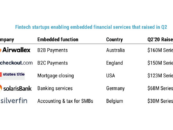
COVID-19 Accelerates Digital Payment and Fintech Adoption in Armenia
by Fintechnews Switzerland June 11, 2021In Armenia, the COVID-19 pandemic has accelerated the adoption of digital payment solutions and boosted e-commerce activity.
Beniamin Tadevosyan, CEO and co-founder of Armenian paytech startup PayX told local fintech news site Fintech.am that, while prior to the pandemic payment technologies were well developed in the country, adoption was very low. But the global health crisis and the government’s call to limit cash usage have push adoption of digital payment to new heights.

Beniamin Tadevosyan
“Due to some local peculiarities, including the habit of the population to pay in cash … [payment technologies in Armenia] were not actively used in everyday life before the pandemic,” Tadevosyan told Fintech.am. “The increase in cashless payments, especially for e-commerce, amid the current situation is natural … [especially considering] that the government and the Central Bank of Armenia have repeatedly strongly recommended non-cash payments.”
Though no official data have been released, Tadevosyan said that at PayX, the volume and value of digital and online transactions “have increased markedly,” a trend he expects to continue.
Demand for online payment solutions, notably those with easy and seamless integration capabilities, has risen particularly, owing in part to the boom of social commerce. “These solutions are especially requested by stores operating on Facebook and Instagram,” he said
Armenia declared a 30-day state of emergency on March 16, 2020 to stop the spread of the COVID-19 virus, which was followed later on by more stringent restrictions on movement. E-commerce skyrocketed after the announcement with retail sales tripling within the first month, Armenia’s Minister of High Technology Industry Hakob Arshakyan said at a press conference on April 8, 2020, describing the trend as a positive indicator that indicates great opportunities in the field of cashless commerce.
Armenia’s nascent fintech industry
Information about the Armenian fintech ecosystem are scarce but data available suggest that the country is home to just a handful of startups. Similarly to other nascent fintech ecosystems, Armenia’s fintech sector is dominated by young startups operating in the payment segment.
PayX, which was founded in 2017, develops digital, mobile and e-commerce payment solutions, serving both the retail and corporate segments. Qsak is an app-based mobile payment platform that allows individuals to receive cash back on their transactions, which they can accumulate, spend, transfer and withdraw.
EasyPay provides merchants with point-of-sale (POS) terminals and consumers with a card-linked wallet that allows them to easily make fund transfers, pay bills, top up their mobile credit, and make purchases both online and offline. So far, more than 2,700 payment terminals have been installed.
And Text And Pay Me is a new startup offering “text payments,” allowing users to perform peer-to-peer (P2P) transfers on any messaging app simply by entering text commands.
Besides payments, other fintech segments are also represented in Armenia, including crowdfunding with platforms such as BoostBloom and Ayo; corporate services with online invoice service My Online Invoice; and data with the likes of Cognaize, a startup that specializes in artificial intelligence (AI)-based processing of financial information.
One fast-growing segment is cryptocurrency and blockchain where a flurry of startups have emerged over the past years.
Arcnet is a local blockchain startup providing a career development ecosystem comprised of a job market, certification, career advice and recruitment services; Omnia offers a platform for users to mine and invest in cryptocurrencies; and Coin Stats is an app-based cryptocurrency portfolio tracker with live crypto market data, research and news. Users can set price limits volume and market cap alerts, and sync multiple crypto exchanges.






